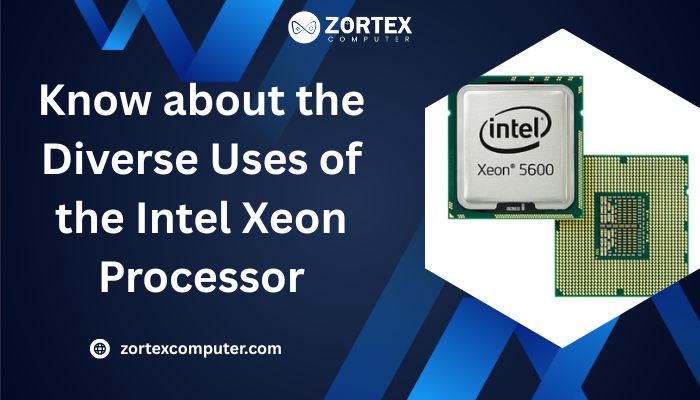Introduction
In today’s world, everything is advancing rapidly with the help of technology. Along with this, computing power is also becoming more and more important. This requires good system performance. If you want to increase the performance and reliability of your system, then you must have a powerful processor. This is where the Intel Xeon processors come into the list of the IT sector and tech enthusiasts.
If you want to know about an Intel Xeon processor, then you have come to the right place. This article will tell us what the features of the Xeon processor are, how it works, and in which fields it is used.
What is an Intel Xeon Processor
Intel Xeon is a high-performance processor built for workstations, servers, and data centers, and it handles high workloads. The performance of an Intel Xeon processor differs from consumer-grade processors such as the Intel Core i7 and i9. Xeon processors have high core counts and threads, high Thermal Design Power, large cache sizes, and advanced Error Correcting Code memory, making them perfect for high-end computing tasks.
Intel Xeon processors come in different models and series, such as the Intel Xeon X series, Xeon E-series, and Xeon Silver, Gold, and Platinum, each designed for the requirements of businesses of varying sizes. The main qualities of Xeon processors are scalability, reliability, and performance, which can handle heavy workloads in business environments.
How do Xeon Intel Processors work
The Intel Xeon processor works on a multicore architecture. These multicore processors perform many tasks simultaneously. Each core performs its own task separately, due to which parallel processing takes place in Xeon processors. So whenever you do heavy workloads or complex work, these processors can work efficiently.
These latest generation Intel Xeon processors contain error correcting code that prevents data corruption. Preventing data corruption increases system reliability. Multi-threading also exists in Xeon processors, which gives the cores the ability to complete tasks quickly, allowing more tasks to be completed.
Xeon processors also support virtualization, providing the resources to run multiple virtual machines on a single server. Thus, Xeon Intel processors provide both maximum performance and stability.
Uses of Intel Xeon Processors
Intel Xeon processors offer versatile features that make them widely used in a wide range of applications. These processors are used to run complex applications that demand high performance and reliability. Below are some key points to help you understand their applications.
Data Centers and Cloud Computing Area
Data centers store extensive data from various businesses. Professionals demand processors with high performance and scalability to keep their businesses running safely and smoothly without any technical issues. Therefore, they use the latest generation Intel Xeon processors, as these processors ensure that high workloads can be managed efficiently.
Xeon processors are also widely used in cloud computing platforms, where virtual machines are run. Cloud computing models demand efficient resource management, which Xeon processors are excellent at.
For big data and enterprise applications
Xeon processors are also widely used in data applications, where Intel Xeon processors can operate powerfully to run Enterprise Resource Planning systems and Customer Relationship Management systems. These processors’ large cache, high bandwidth, and cores allow businesses to process data quickly. For businesses with large data, whether structured or unstructured, Intel Xeon processors have the capacity to analyze and store it.
Machine Learning and Artificial Intelligence
Intel Xeon processors are also used for AI and machine learning. They easily handle complex tasks like data inference and AI model training. The high-threading and multi-core architecture of Xeon processors can prove very useful for AI.
These Xeon processors also feature technologies like Deep Learning, which accelerate AI and ML workloads. Xeon processors are used for AI-driven tasks in data centers and are used in various industries such as finance, healthcare, and automotive.
For Workstations
If you use high-grade software like Adobe Premiere Pro, AutoCAD, or DaVinci Resolve, you need a quality and powerful workstation. These Xeon processors are used in workstations like these, which handle complex tasks like video rendering, 3D modeling, and scientific research.
This latest generation’s Intel Xeon processors are capable of processing huge data with the help of high core counts and multi-threads. Its ECC system also ensures stability, which is crucial for professionals.
Scientific Research
Xeon Intel processors are also useful for scientific research. In tasks like weather forecasting, scientific models, and drug discovery, these processors can work efficiently with the help of parallel processing and high memory bandwidth.
Conclusion
In today’s digital world, businesses also need good data processors for regular growth. Therefore, Intel Xeon processors can be used in high-performance computing environments. Xeon processors’ high performance and reliability can provide solutions in cloud computing, data centers, scientific research, workstations, and AI applications. So, if you want better results for your business, trust Intel Xeon processors once.
